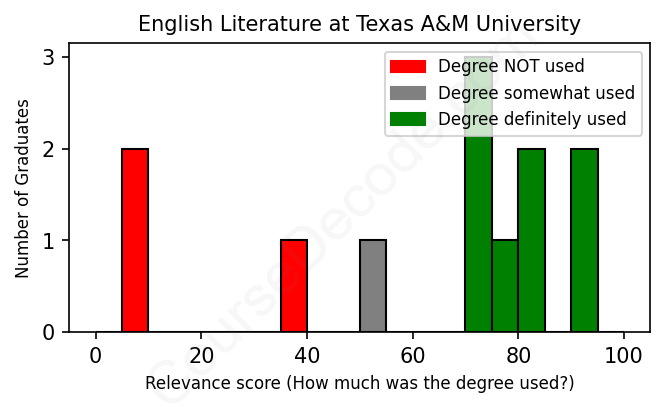
First, some facts. Of the English Literature graduates from Texas A&M University we've analyzed , here's how many have used (or NOT used) their degree in their career:

These are estimates based on AI analysis of 12 LinkedIn profiles (see below).
The verdict? Below average. Overall, with an average relevance score of 61%, English Literature graduates from Texas A&M University have a lower likelihood (-6%) of finding work in this field compared to the average graduate across all fields:
And for comparison, here's the chart for all profiles we've looked at across all degrees.
Also, after graduating, 58% of these graduates have pursued further education other than another Bachelor's degree (such as a Masters degree or other), compared to the average across all profiles of 35%. This suggests you may need more than just a Bachelors degree to be competitive as a English Literature graduate.
See the details:
|
Relevance score: 80% We think this person has gone into a career highly relevant to their degree. We think this person has gone into a career highly relevant to their degree.
DEGREE INFOGraduated in 2019 from Texas A&M University with a Bachelor of Arts in English Literature. Also pursued further education since (see below). JOB HISTORY SINCE GRADUATIONFreelance Editor [NAME REMOVED] Mathews Editorial Mar 2020 - Present Assistant Editor  Texas A&M Transportation Institute Nov 2021 - Present FURTHER DEGREES DONE SINCE GRADUATINGCertificateUniversity of Washington 2019 - 2020 ABOUTNo information provided. |
The top 10 most common jobs done by the graduates we've analyzed (ranked most common to least) are:
When looking at the career paths of graduates in English Literature from Texas A&M University, a mixed picture emerges. Many have found roles in education, particularly as teachers in English Language Arts (ELA), where their literary skills are crucial. Positions like ELA Teacher, Training and Development Specialist, and various librarian roles illustrate a strong connection to their English Literature studies. These jobs involve a direct application of their knowledge in literature analysis, teaching methodologies, and communication skills, making them highly relevant to the degree. It's clear that a significant number of alumni have focused on education, which remains a predominant field for those with an English Literature background.
On the flip side, there are quite a few graduates who have ventured into areas that don't necessarily require a deep understanding of English Literature. For example, roles in marketing, administrative support, or logistics don’t heavily rely on the analytical or creative writing skills typically emphasized in literary studies. While some of these positions benefit from general communication skills, they're not directly tied to literary analysis or literature engagement. Therefore, while many graduates have landed in satisfying roles that utilize their English Literature knowledge, others have taken more tangential paths that don't capitalize on their degree as effectively.
Here is a visual representation of the most common words in job titles for English Literature graduates (this is across all English Literature graduates we've analyzed, not just those who went to Texas A&M University):

Looking at the career trajectories of graduates from Texas A&M University with a degree in English Literature, it seems there's quite a mix. Right after graduation, many of them landed jobs in education, administrative roles, and content-related fields. For instance, a good number took on teaching positions, either as English teachers or in specialized roles like ELA Team Leader, which makes sense given their background. Others ventured into freelance writing or content creation, which aligns well with their skills in writing and communication. However, there were also many who took on jobs that seemed less connected to their degree, such as administrative assistants or delivery drivers, particularly in those first few years after graduation.
Fast forward five to ten years, and it looks like many of these graduates have found their rhythm, especially those who stayed in the education sector or moved into writing and content management. Teachers have progressed to roles as department heads or specialized educators, while those who started in writing often moved into more advanced roles in content strategy or marketing. That said, some still seem to be in jobs that aren’t directly related to English Literature, showing that the path can be quite varied. Overall, while there are definitely success stories among these grads, others have had to pivot into roles that might not fully utilize their literary training.
Honestly, a Bachelor’s degree in English Literature can be pretty challenging, but it also depends on your personal strengths and interests. At Texas A&M University, like many other schools, you'll be doing a lot of reading, analyzing texts, and writing essays, which can be time-consuming and require deep thinking. If you love literature and enjoy discussing themes, characters, and styles, it might feel easier for you! But if you're not super into reading or writing, it could be tough to keep up with the workload and the critical analysis required. So, it’s definitely not a walk in the park, but it can be really rewarding if you’re passionate about it!
Most commonly, in the LinkedIn profiles we've looked at, it takes people 4 years to finish a Bachelor degree in English Literature.
Based on the job histories of these Texas A&M English grads, it seems like they’ve had a mixed bag when it comes to earnings. A lot of these positions, especially early on, are in education or temp jobs, which typically don’t pay that well, especially for someone just starting out. Over time, though, some of them appear to have moved up the ladder into roles like content manager and digital marketing manager, which likely come with better salaries. So, while their paths may not have started off lucrative, there is evidence that they’ve gradually entered more profitable positions. Overall, it looks like it took some time, but many have the potential to make decent money now and in the future!
Here is a visual representation of the most common words seen in the "about" section of LinkedIn profiles who have a Bachelor degree in English Literature (this is across all English Literature graduates we've analyzed, not just those who went to Texas A&M University). This may or may not be useful:

Here are all colleges offering a Bachelor degree in English Literature (ordered by the average relevance score of their English Literature graduates, best to worst) where we have analyzed at least 10 of their graduates: